Cancer Survivors Share Their Stories on Capitol Hill
The American Association for Cancer Research (AACR) is proud to support the Scientist↔Survivor Program (SSP), which provides cancer survivors with opportunities to engage in cancer research, survivorship issues, advocacy, and public policy. In recent years, our survivor advocates have played an instrumental part in the AACR’s efforts to engage U.S. lawmakers in providing robust support for biomedical research.
Earlier this spring, SSP alumni Jamie Holloway of Arlington, Virginia; Richard Gelb of Beacon Falls, Connecticut; and Kim Hall Jackson of Philadelphia joined staffers from the AACR and the Association of American Cancer Institutes (AACI) in visiting members of Congress as part of AACR-AACI Hill Day. Their stories of survival bring powerful emotions to the AACR’s advocacy efforts. In honor of National Cancer Survivors Day, which will be celebrated Sunday, June 3, Jamie and Richard shared their stories.
From researcher to patient to advocate
By Jamie Holloway
Five years ago, after finishing treatment for breast cancer, I jumped into the world of cancer research advocacy with both feet, and I said “yes” to just about any advocacy activity I could find. The glaring exception was fundraising and legislative advocacy. I don’t like asking people for money and I don’t like partisan politics, so I thought I could safely say I wouldn’t be effective in those areas.
However, it’s harder to say no in person! So when I was at an advocacy event in Washington, D.C., last winter, I found myself agreeing to come to the AACR-AACI Hill Day in April.
Mary Lee Watts leads the policy team for AACR, and she assured me that I didn’t need to be a professional lobbyist to do well, and that she would make sure I was prepared. Mostly, she said I should tell my own story.
My story is a bit different from many advocates’ experience, because I started out as a cancer researcher, then became a patient when I was diagnosed with triple-negative breast cancer in 2012. I spoke with Senators, Representatives, and a few staffers and told them about my training as a researcher, my diagnosis and treatment, and then shared how important it has been—and will continue to be—to maintain sustainable and predictable levels of funding for the National Institutes of Health.
This is an exciting time in cancer research; I’ve seen a tremendous degree of collaboration since the creation of the FDA Oncology Center of Excellence (OCE). I’ve been so impressed at the outcomes from that group already, it was easy to ask that they be fully funded in the next budget. The legislators and their staff members wanted to hear what I had to say, and they listened intently and asked questions. Even with critical hearings and rushed schedules, everyone in each room reinforced that my story was important and my contributions to the discussion were valuable.
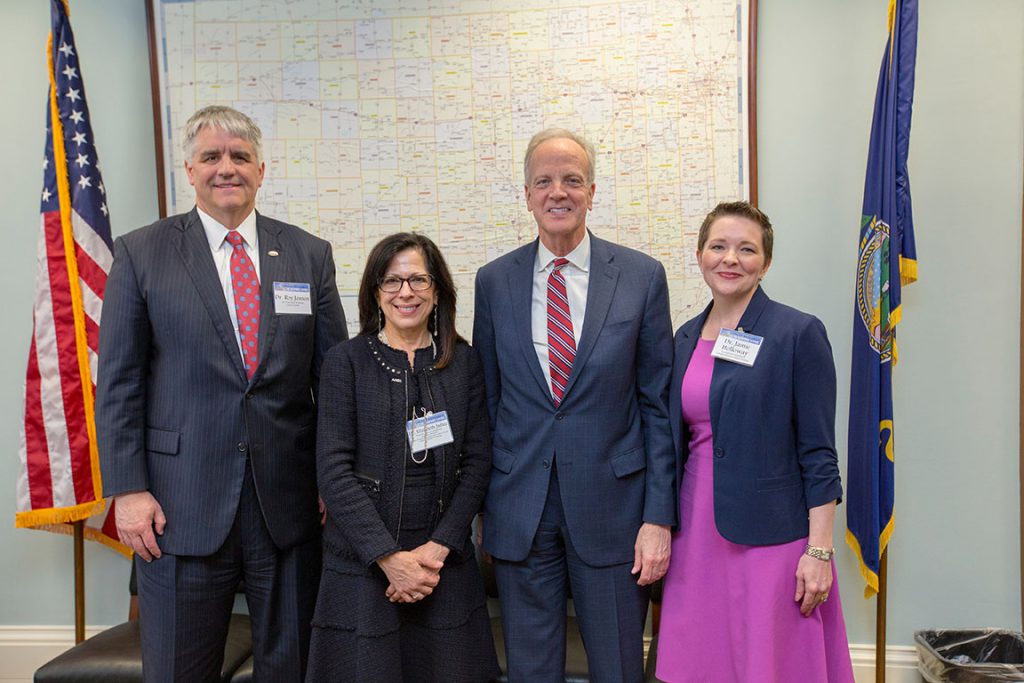
Roy Jensen, MD, President-elect of the Association of American Cancer Institutes; Elizabeth M. Jaffee, MD, President of the American Association for Cancer Research; Senator Jerry Moran (R-Kansas); and Jamie Holloway.
I spent the day in the company of two brilliant oncologists, which was a treat! We met with legislators from both sides of the aisle, and found overwhelming support to fund the National Institutes of Health and FDA OCE to continue to improve biomedical research. I didn’t really even have to ask for money— I just emphasized the importance of making those spending areas a priority, and this came naturally since I was sharing my personal experiences.
I’ve found frequently that when I say “yes” to something that I don’t think I can do, it’s usually an opportunity to grow my abilities in a new way, and this was no exception. I’m so glad that I pushed past my initial hesitancy. On many fronts, I think it was a day well spent.
Learning to share the cancer story
By Richard Gelb
Earlier this spring, I was invited to participate in AACR-AACI Hill Day, a periodic event focused on building congressional support for cancer research and biomedical science. Guided by professionals from the AACR and the AACI, I joined several other cancer survivors and advocates to help put a personal face on the disease.
My cancer story encompasses caregiving as well as my own illness. I was the caregiver for my wife, who was diagnosed in 1981 with transitional carcinoma of the bladder and kidney. Although she recovered, her cancer recurred in 2001, and she died in 2004. I was diagnosed with prostate cancer in 2012 and a melanoma in 2014. As of this present moment, I am cancer-free.
Sharing one’s cancer experience is referred to as “putting a face on cancer.” On Capitol Hill, at cancer fundraising events, and at scientific and medical meetings, survivor advocates share their cancer stories, including details of their illness, the emotional roller coaster as they experience diagnosis and treatment, followed by learning to live with cancer, or “cancer survivorship.” This adds up to what I think of as an “illness narrative,” which includes the emotions of cancer: uncertainty, worry, pain, and suffering.
I made the rounds on Capitol Hill with a team from the Yale Cancer Center that included an oncologist and a cancer scientist. The cancer professionals were responsible for thanking the legislative staff, describing the importance of federal funding for cancer research, and explaining the scientific and medical breakthroughs that have been achieved due to cancer research.
My job as the survivor advocate was to share my personal experience with cancer, at three meetings with House and Senate staff responsible for health care legislation.
It is an awkward situation to have to share one’s personal experience with illness, and the full spectrum of emotions that accompany it. Many health care professionals, family members, and friends have trouble having these “sacred conversations” about illness, pain, and suffering. Now imagine sharing these emotions in a public setting, with people you’ve just met, many of whom have not experienced a life-threatening illness.
I enjoyed my time on Capitol Hill, and I hope that by sharing my personal cancer journey with the staff of House and Senate members, they may be inspired to fight for robust, sustained, and predictable funding for the National Institutes of Health and the National Cancer Institute.
However, I did leave Washington with some questions. Does “putting a face on cancer” really make a difference? Does it help educate lawmakers and influence policy and funding decisions? Does it educate or inspire the public and help change behavior? Assuming that it does make a difference, how can cancer survivors and advocates be trained to share our stories even more effectively? There is a considerable amount of research on improving physician-patient communications, and this experience made me wonder how we might improve communications between patient advocates and policymakers and the public.
I don’t believe any of the Hill Day organizers, the cancer center team members, or even I realized the emotional toll I would feel after sharing my cancer journey; it felt like another trip on the emotional roller coaster. However, I believe our purpose was important, and you can count on me for the next Hill Day!
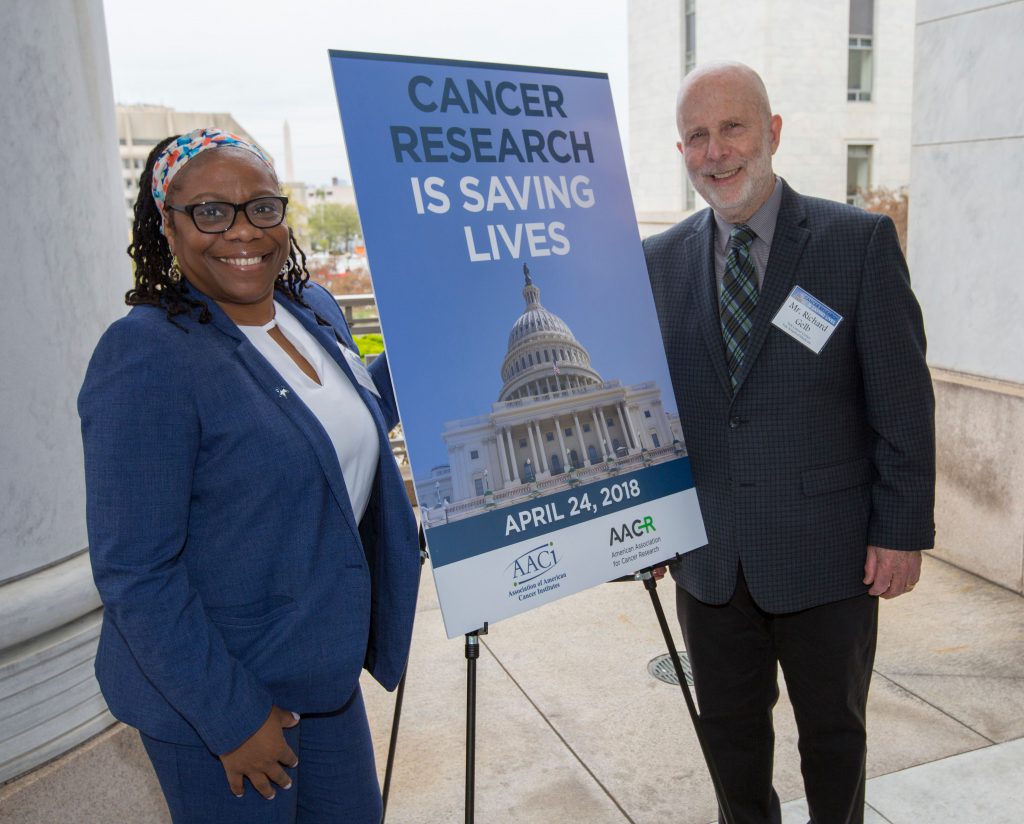
Kim Hall Jackson and Richard Gelb joined the AACR and AACI to discuss the importance of robust, sustained and predictable funding for cancer research.

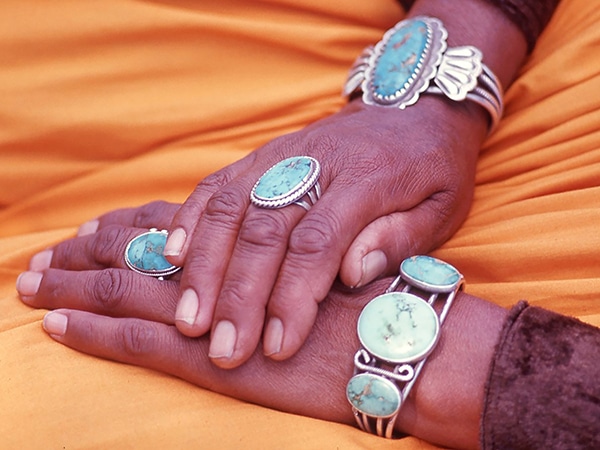
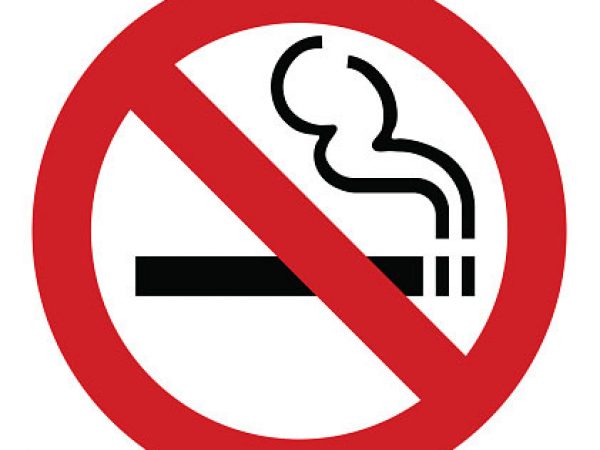
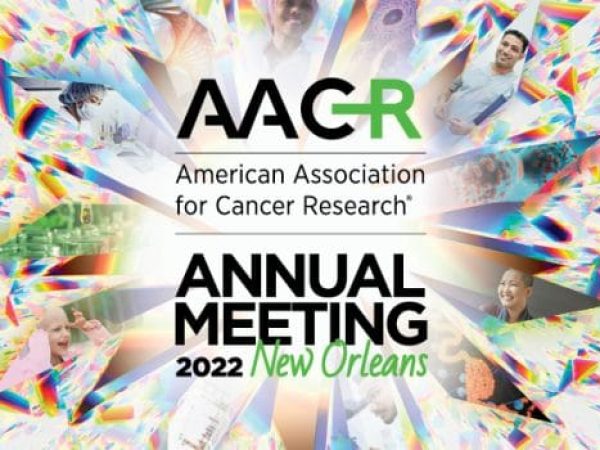
Thank you for such inspiring and encouraging stories. Researches like this will surely help in many ways to prevent and cure cancer.